 |
 |
 |
 |
 |
 |
 |
 |
 |
 |
 |
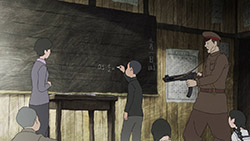 |
 |
 |
 |
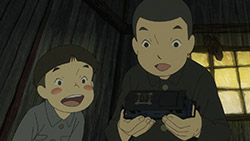 |
 |
 |
 |
 |
 |
 |
 |
 |
 |
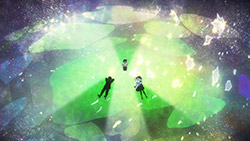 |
 |
 |
 |
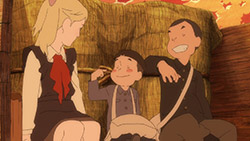 |
 |
 |
 |
 |
 |
 |
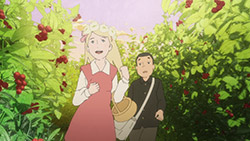 |
 |
 |
 |
 |
 |
 |
 |
 |
 |
 |
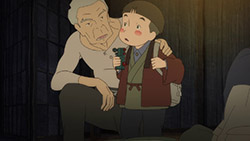 |
 |
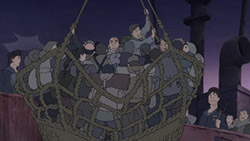 |
 |
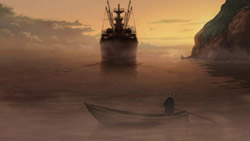 |
 |
 |
 |
 |
 |
 |
 |
 |
 |
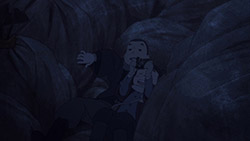 |
 |
 |
 |
 |
 |
 |
 |
 |
 |
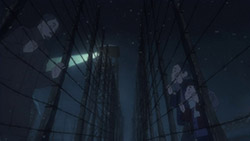 |
 |
 |
 |
 |
 |
 |
 |
 |
 |
 |
 |
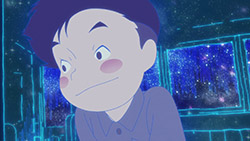 |
 |
 |
 |
 |
 |
 |
 |
 |
 |
 |
 |
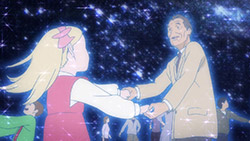 |
 |
 |
 |
 |
「ジョバンニの島」 (Giovanni no Shima)
“Giovanni’s Island”
“You can stay with us.” Giovanni said, unable to contain himself. “We’ve got a ticket that goes on forever!”
It’s not as though a movie that takes Miyazawa Kenji’s Night on the Galactic Railroad as its spiritual inspiration being heartbreaking comes as a surprise. Still, Production I.G.’s Giovanni’s Island is a real emotional sledgehammer – occasionally a bit heavy-handed with the sentimentality, but it’s hard to begrudge it that given the subject matter. It takes us back to a period in history that has a seemingly endless supply of tragedy to go around, and in the larger scheme of things perhaps what happens in this film is but a drop in the ocean – but it’s in showing us the human faces of such dark times that a story can make the deepest emotional connections.
Seemingly endless as well is the tug Miyazawa’s novel holds on the Japanese consciousness – it’s a story beloved by children and adults alike, a perfect storm of sadness, self-sacrifice and loss written by a man trying to cope with the death of the sister he loved more than anyone else in the world. Miyazawa-sensei wrote the story while traveling in Karafuto – the once-Japanese and now Russian island now known to the world as Sakhalin. And Giovanni’s Island returns to that setting, using the novel as the spine that connects the events in the story.
Giovanno no Shima is based on the life of a real man, Tokuno Hiroshi – a native of the tiny once-Japanese island of Shikotan who was forced to abandon it with the remains of his family when it fell under Soviet occupation after World War II. The screenplay was written by Japanese Academy Award-winning writer/director Sugita Shigemichi, and the film is directed by longtime veteran Nishikubo Mizuho. It’s the story of those first years after the Japanese surrendered to the Allies on August 15, 1945 as told through the eyes of its hero, Senou Junpei (Yokoyama Kouta). Or rather, through his memories – as the events are the flashbacks of the now elderly Junpei (Nakadai Tatsuya), returning to the island for the first time (Tokuno-san has returned to Shikotan regularly since the collapse of the Soviet Union made it possible).
That last point is important, because Nishikubo-sensei has chosen to animate the scenes from Junpei’s childhood with much simpler character designs and movements than the modern ones, as reflects a child’s eye view of the world (a fact utterly missed by many reviewers, I might add). The backgrounds, however, are gorgeously detailed – and in pairing them with the stylized designs and animation, give a storybook quality to those glimpses of the past (which make up most of the narrative). Interwoven with these are fantastic flights of the imagination when Junpei and his younger brother Kanta (Taniai Junya) enter the world of their favorite book, Night on the Galactic Railroad – which are often necessitated by the cruel nature of the lives the boys are leading.
Make no mistake – this is not a political film in any way, shape or form. It makes no effort to balance the moral scales of the Americans who bombed Japan, the Soviet occupiers, or the Japanese Imperial forces – nor should it. These concerns were not on the minds of the 10 year-old Junpei and the 7 year-old Kanta – they were worried only about their simple lives on their remote island, and the impact these larger events had on them. About the closest the film comes to commentary is when Junpei, Kanta and their teacher-protector Sawako-san (Nakama Yukie), lost in a blizzard on Karafuto while trying to reach the prison camp where their father Tatsuo (Ichimura Masachika) is being held, receive assistance from a Korean camp worker who comments on how ironic it is that she should help “Japs”, when the Japanese government did nothing to help repatriate the Korean slave laborers abducted into service by the Imperial government.
Giovanno no Shima slides effortlessly through many moods, but this is always a sentimentally-driven film – it’s powered by the oversized emotions of childhood, as remembered by an old man. When the Soviets arrive on Shikotan they kick the natives out of their classrooms and their houses, treating them as virtual prisoners. Yet there are moments when the locals and the occupiers connect with each other, most obviously the generation too young to fight in wars. Especially powerful is the moment when the Japanese children – shunted off to the tiny spare classroom adjacent to their old one – sing the Russian folk song they’ve been hearing through the thin walls, and the Russian class reciprocates by singing the Japanese one the local students have been singing to the accompaniment of Sawako-sensei’s guitar.
Among other larger-than-life emotional elements is the story of Junpei’s first love, for the daughter of the Russian commander who’s moved his family into his house and forced the occupants into the stable. Tanya (Ilyushenko Polina) is beautiful, blonde, and very much a storybook figure herself – so much so that Junpei takes to sketching her with regularity. Tanya comes to feel about Junpei as he does about her, but obviously this is a romance that’s doomed before it ever has a chance to flower – it’s events concerning the arrest of Junepi’s father that initially derail it, but Junpei and his family (less his elderly grandfather, who’s stays behind to die where he was born) are exiled to a labor camp on Karafuto after having been told they were being sent home.
Things get very, very dark after that. The fact that Junpei has taken (for Tanya’s benefit) to calling himself Giovanni and Kanta Campanella should give you some idea of where things are headed. The boys’ scheming but protective uncle Hideo (Santamaria Yusuke) does his best to keep the boys and Sawako alive by hook or by crook, but it’s tough sledding. Eventually Hideo discovers that Tatsuo is alive, and the boys take off on a Quixotic attempt to see him at the prison camp in the snowy wilds past the final stop on the railroad. This is a tragedy, not a suspense film – we know where things are headed, more or less, but that doesn’t lessen their impact a bit.
The final moments of the scenes from the distant past, as well as the more hopeful present-day postscript that follows, might be seen by some as heavy-handed. I won’t argue that they pack the emotional subtlety of what Roger Ebert called “the greatest anti-war film of all time”, Grave of the Fireflies – but I find them very powerful nonetheless. What they lack in subtlety they make up for in emotional truth, and there can be no doubt that to the child Junpei (and Tokuno) who lived these events, the emotions were every bit as powerful as they’re depicted here.
In addition to the gorgeous backgrounds and stylized animation, a special note should be made about the casting. Not only are 12 year-old Yokoyama-kun and 7 year-old Taniai-kun heart-rendingly genuine, but the Russian characters are played by Russian actors – and the Russian songs performed by a Russian children’s choir. Yokoyama especially has a huge load to bear here, in a role that forces him to convey an extremely broad range of emotions and moods, and he turns in an astonishingly effective performance.
Giovanni no Shima is a true expression of anime as art. It’s hand-drawn, simultaneously wildly imaginative and grounded in unvarnished truth. It’s won its share of awards at film festivals around the world, but for the most part has barely caused a ripple in the pond at home or abroad, not doing much at the box office and barely being noticed by anime fans. When we see a film like this – painstakingly created by hand, filled with honest feeling and imagination – make so little impact and compare it against what generally does make an impact in the world of anime, it’s hard to feel much enthusiasm for the future of the medium as a serious art form. Yet there’s no other medium in which a film like Giovanni no Shima could exist – not in live-action, and not in American animation. Like the events it depicts, this film is both hopeful and tragic – its reception may not bode well for the future of anime like it, but that it could come to exist in the first place is a reason to feel proud to be an anime fan.
ED Sequence
 |
 |
 |
 |
 |
 |
 |
 |

this looks like a good one, I will have to check it out!
Sometimes i feel the creators at Production IG have unresolved trauma about WW2 and losing the war. Prodution IG constantly depicts fictional situations where the Japanese and the westerners enter conflict, and the outcome is usually: Japan doesn’t win, but there is enough saving grace and dignity to make Japan look good to their own eyes. Also, westerners are usually just secondary elements and they rarely move the story forward; westerners may bring the problem to the doorstep, but it is ALWAYS the Japanese who solve that problem, through hard work and sincerity.
Well I can’t exactly complain, this show was intended for Japanese audiences only, and no one else.
At the surface level, the story looks like it’s about humanitarian strength and perseverance, but it’s really about Asian male fantasy of connecting intimately with Caucasians females.
There is no other way to explain the choice of character for the “meaningful” encounter in the end.
And again, if westerners were given importance instead of just being secondary elements to serve the Japanese protagonists, the person that would have been the exact same person we saw earlier, not the “beautiful” analogy of the person.
To put it harshly, this is how Production IG masturbates.
To put it mildly, Production IG is trying to depict a touchy situation and then show how human courage will triumph and let everyone walk away with dignity, but Producton IG is still treating white people like pretty-looking set pieces, and not real human beings.
I forget where I heard this but someone once mentioned that Japan is people comprised of xenophobes that are polite.
I know when I visit around the time Tokyo Games, they will be welcoming me upfront, but deep inside, they will think “kono kusotare gaijin, kane haratte sassato kaere!”
(damn foreigner, give us your money and then get the hell out!)
Wow, that is somewhat harsh. GE, since you live in Japan, could you comment on this?
Well here’s the thing. Native Japanese people’s behavior towards whites is:
looking at whites as invaders
or
looking at whites as celebrities
or
looking at whites as invading celebrities.
All of these far from behavior pattern of interacting with a “normal” human being.
The language barrier makes the situation even worse.
and good luck making a actual Japanese explain to you what they really think about foreigners, they’re too polite to say anything to your face that may offend you.
What you have to do is eavesdrop on what they say among themselves, and there are plenty of those on Japanese BBS.
In summary, they hate our guts, but sometimes forget that fact when we look pretty to them, hence the description “invading celebrities”.
Everyone is entitled to their opinion, of course. In my view this one is a gross oversimplification of the Japanese perspective at best and an outright misread at worst. And in any event I think it misses the point of what the movie is. It’s a childhood memoir, not a political statement, and the romance is strictly puppy love.
I don’t particularly agree with Calorie Mate’s assessment of what Giovanni no Shima is about, but I have to concede that Japan and xenophobia are unfortunately all too familiar with each other, perhaps owing to their homogenous society. Some Japanese (definitely not all) do have a rather revisionist view of the War (again, I must stress that I don’t think that’s what this movie is about). Compare and contrast Germany’s approach to it and you’ll see a very different national philosophy.
I mean, I was kind of feeling a “war is silly, despite our differences we can all get along” type of vibe through this whole thing. DID YOU SHED NOT ONE TEAR WHEN THEY SANG EACH OTHERS SONG (;~;)
Sorry, it reminded me of that snowing episode of Girls and Panzer too much.
tolerance is as a matter of fact the behavior of letting something “be” while at the same time not liking it (you dont “tolerate” your fortune or the air you breathe). In that sense – the Japanese are one of the most tolerant people 😉
Sounds interesting. Will check it out!
Yeah, oversimplification just like “Americans are loud and obnoxious and Islomophobes.”
And the puppy love, it’s harbored by a oooooold man and the object of the love is um…. er…..
Can you think of why why the character was changed to an analogy?
I can think of only one reason, and yeah, maybe I’m too dumb to think of other reasons.
Sorry guys, I was drunk when I wrote that nonsense and I’ve sobered up now and see how it’s derailing, derogatory, misleading, and has nothing to do with the actual movie.
The movie itself is a beautiful work of animation with lots of expressive characters and kind human emotions in an otherwise bleak situation.
Mods could you please delete my nonsense postings? I’m really embarrassed about it.
I apologize to people I have offended, I look forward to making many friends in Japan during Tokyo Games.
So lucky to have seen this at the Scotland Loves Anime festival, many many manly tears were shed (especially that damn barbwire scene!). Thoroughly recommend it!!
I’m glad you reviewed this. As a Russian speaker, I was thrilled to see some dedication to cast native VA’s and the voice over was completely accent-free. I think I cracked the most when each group tried speaking the other language. Ahh ,the Engrish nostalgia!
I especially liked the moment when they sang each other’s songs. That was quietly powerful.
Yes indeed! When I they started singing I almost always sang along under my breath. Is Katusha something you can find in a karaoke in Japan? If not, it should be.
Some opinions become facts.
Thanks for reviewing this Guardian.
Some of the earlier posters were a bit ambivalent about a movie not focusing on Japanese atrocities; one of my close friends teaches University history and in his WW2 class he mentions ‘What if Japan were an island off the coast of Portugal, and thus white?’.
And the answer is that no one would have cared about Japan carving up a bit of China. Remember, when you think of all of the Japanese atrocities, remind yourself of the atrocities carried out by the UK, France, Germany, Italy, Netherlands and USA in China and southeast Asia. It is very easy to remember the atrocities of a country that lost, not so easy to think of your own country in that light.
Sorry for the soap box Guardian.
I really hope you and your professor friend are not genuinely implying that people wouldn’t care about Japan “carving up bit of China” (how’s that for an understatement?) and their atrocities if they were white. That’s just absurd.
Sigh.
Actually, people who say ‘that’s absurd’ are usually the absurd ones.
So, was Britain condemned by the world and embargoed for taking, what 11 ports in China and forcing China to buy Opium, and to remove all tariffs from British goods? Were the Germans or French condemned for their stealing of Chinese ports, killing and defacto enslaving many Chinese, forcing the Chinese government to allow their missionaries free access to China, and not allowing the Chinese government to prosecute Europeans?
You will find that if you stop saying ‘absurd!’ that White Man’s Burden was an excuse to do the same things that Japan then did.
Oh, and if you feel that the Japanese killed so many, no comparison, I invite you to read about the dutch in Indonesia. Who were not condemned.
War guilt is far more complicated than most Western Europeans or Americans would like to realize.
The entire premise of your absurd argument comes down to “Americans/Europeans did horrible things so it is absurd to condemn the Japanese for their own.”
You keep saying things like “was Britain condemned by the world?” and “…the Dutch in Indonesia. Who were not condemned.” Just because they were not condemned at the time does not change that fact that we can condemn for the crimes they were today and we do.
All the actions you mentioned committed by the Europeans were absolutely criminal and are universally condemned….as are the crimes committed by the Japanese. Condemning Japanese atrocities does not preclude one from condemning European/Western ones as well.
Sigh. Again.
Would you like to put a few more words into my mouth? You are an example of what is wrong with the internet; people used to be taught to keep their mouth closed until they knew what they were talking about.
I never said Japan should not be condemned and if you bothered reading you would know that. My point is that if Japan or Germany are mentioned in a movie 50% of people commenting will think that the movie maker is attempting to avoid deserved war guilt. Without fail. I saw this with Wind Rises. Among many others.
Funny how if a British movie comes out they are heroic, plucky, intelligent, have bad food, a stiff upper lip but no one ever says ‘I don’t think the movie maker showed enough British war guilt.’
Japan fought a war and lost. Two generations ago. Let people make movies about people who were frickin’ kids when the war was declared! They did not cause or participate in the war.
Yes I am what’s wrong with the internet today – very nice.
I love how you just throw out stuff like “if Japan or Germany are mentioned in a movie 50% of people commenting think that the movie maker is attempting to avoid deserved war guilt.”
Too bad good films about WW2 actually are well nuanced to show the complicated nature of war guilt. From the Germans, for instance, films like Das Boot, Stalingrad, and Untergang (Downfall) do this well. Sure there are “good” Germans portrayed, but the overwhelming barbarity of the state they serve is never in doubt – there is no idealization. And almost all German film post WW2 has been very critical of its past – can you name even ONE German film that has been criticized for avoiding war guilt? Your attempt to lump the Germans in with the Japanese in war guilt denial/avoidance is something perhaps you should “shut your mouth” about until you know what you are talking about.
And you’re claims about western films is equally foolish. I don’t know what brainless one-sided films you watch, but GOOD western cinema about war is always well nuanced. Full Metal Jacket, Apocalypse Now, Platoon…even Saving Private Ryan shows Americans soldiers murdering surrendering enemies in cold blood.
But hey, I’m only saying all this because Japan is not an island off the coast of Portugal.
It’s depressing for so much of this debate to end up focusing on politics, when the movie itself steadfastly avoids politics for the most part. For the benefit of those who haven’t seen it, don’t be deceived by the tone of the comments – the film doesn’t take on these issues in any major way at all. it’s a personal story, plain and simple, and when it does take on larger issues it’s in the direction of tolerance and forgiveness.
It’s worth noting that many of the atrocities of the war are implied:
– The Korean mother who takes in the children said something to the effect of “I wouldn’t do this for you if it weren’t for the children.”
– When asked where the uncle got the train from he responds “Well I just took it from an abandoned house.”
I wonder if the Korean worker was one of the tens of thousands who could not be repatriated to Korea or Japan.
Thank you Enzo! I hadn’t heard of this one. Will check it out soon. 🙂